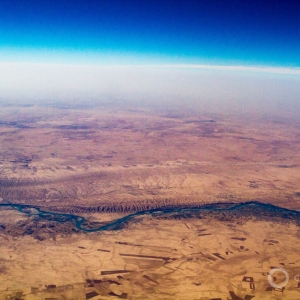The Stream, October 5, 2021: Are the Great Lakes Prepared to Battle Climate Change?
YOUR GLOBAL RUNDOWN
- A report from UN officials called for water equity between Palestine and Israel.
- A pipeline failure on California’s coast leaked more than 100,000 gallons of oil into the Pacific Ocean and a protected wetland.
- Tropical Cyclone Shaheen tore through the country of Oman this weekend as nearby countries stay on high alert.
- The S. Supreme Court hears its first case over interstate groundwater use.
The Great Lakes region is being battered by climate change, even as its being advertised as a climate refuge.
“The extremes are getting way more extreme.” – Dennis Stachewicz, the City Planning Director in Marquette, Michigan. CBS News reports that more intense and frequent storms along coastal communities in the Great Lakes region are causing erosion, flooding, and other climate-induced disasters. Officials in cities across the region say they aren’t prepared for the future, even as experts are calling it a “climate haven.”
- Why it matters: The Great Lakes region is frequently touted as one of the most climate-resilient places in the U.S., in no small part because of its enviable water resources. But climate change also threatens water quality, availability, and aging water infrastructure by exposing existing vulnerabilities and creating new ones. In the Great Lakes: Ready or Not? series, members of the Great Lakes News Collaborative explore what it may take to prepare the Great Lakes region for the future climatologists say we can expect. The collaborative’s four nonprofit newsrooms — Bridge Michigan, Circle of Blue, Great Lakes Now at DPTVand Michigan Radio — aim to elevate discussion, amplify the voice of Michigan residents and produce action that protects the region’s waters for future generations.
IN RECENT WATER NEWS
In Case You Missed It:
HotSpots H2O: Years-Long Drought Pushes Brazil to the Brink – The country’s worst drought in nearly a century is choking commerce, threatening ecosystems, and diminishing hydroelectric power generation.
What’s Up With Water – October 4, 2021 – This week’s episode of What’s Up With Water covers the lasting effects of Western wildfires, rising insurance premiums for homes at risk of flooding in the United States, and the scarce or unreliable data for properties that have flooded around the world.
UN Report Calls for Water Equity in Palestine and Israel
During the 48th session of the Human Rights Council in Geneva late last week, UN High Commissioner for Human Rights Michelle Bachelet and her office called for equitable distribution of water between Israel and Palestine, The Jerusalem Post reports. The problem is especially severe in Gaza and Area C of the West Bank, the UN’s report said, where an estimated 14,000 Palestinians aren’t connected to a water network or water infrastructure. Climate change, population growth, aging infrastructure, and political conflict all contribute to the gaps in water access.
TODAY’S TOP WATER STORIES, TOLD IN NUMBERS
126,000 GALLONS
A pipeline failure caused at least 126,000 gallons of oil to spill into the Pacific Ocean off the coast of Orange County, California over the weekend. The spill extended 13 square miles from Huntington Beach to Newport Beach, where cleanup crews raced to contain the spill that had already caused dead fish and birds to wash ashore. The New York Times reports that the oil slick appeared to have reached the Talbert Marsh, a 25-acre protected wetland near Huntington State Beach that is home to dozens of species of birds.
4 PEOPLE
Tropical Cyclone Shaheen battered the country of Oman on Sunday with strong winds and heavy rain, killing at least four people. Reuters reported that the storm was expected to bring up to 20 inches (500 cm) of rain in some areas, raising the risk of flash floods. Officials in nearby countries, like Saudi Arabia and the United Arab Emirates, were also preparing for torrential rain on Monday.
ON THE RADAR
Justices of the U.S. Supreme Court are questioning whether a dispute over groundwater resources would be better resolved by interstate compacts or Congress, Bloomberg Law reports. In the first case of its kind to reach the highest court, Mississippi claims that Tennessee has been siphoning water that would ordinarily flow to Mississippi. A court-appointed special master has previously ruled that Mississippi should have pursued a claim for equitable apportionment, which asks the Supreme Court to issue a decree saying how much water states can use from interstate resources. Mississippi appealed the ruling, but in Monday’s arguments, justices again asked about equitable apportionment, saying that would be the appropriate remedy for disputes under legal precedent. The outcome of the case could have profound implications for how states manage natural resources.
Jane is a Communications Associate for Circle of Blue. She writes The Stream and has covered domestic and international water issues for Circle of Blue. She is a recent graduate of Grand Valley State University, where she studied Multimedia Journalism and Women, Gender and Sexuality Studies. During her time at Grand Valley, she was the host of the Community Service Learning Center podcast Be the Change. Currently based in Grand Rapids, Michigan, Jane enjoys listening to music, reading and spending time outdoors.






Leave a Reply
Want to join the discussion?Feel free to contribute!